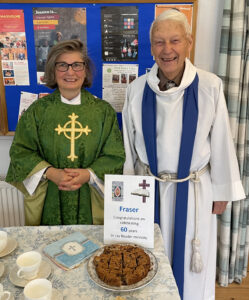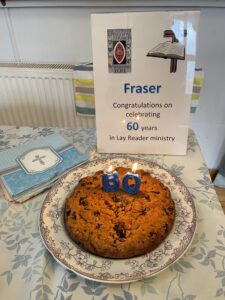 Last Sunday after Trinity 2022 and Bible Sunday St Andrew’s Milngavie
Last Sunday after Trinity 2022 and Bible Sunday St Andrew’s Milngavie
Dear All
Today at our Sung Eucharist through praise, hymn and sacrament we celebrated with enormous gratitude Fraser’s 60th year of Reader ministry – we all congratulated him on such an achievement – 60 years of faithful commitment to his calling to serve God and his people within the SEC. Fraser preached heartfelt words of wisdom and chose the hymns which Harry accompanied so expertly. We then all adjourned to the hall for coffee to sample his celebration cake! It was a lovely morning reminding of the joys of ministry and the warmth of the church family.
Notices for this week:
Tuesday 10am Prayer Group in the Garden Room.
Thursday 10am Said Eucharist followed by coffee in Friendship House
Readings for next Sunday – All Saints Day – Daniel 7:1-3,15-18, Ephesians 11:11-end, Luke 6:20-31
This Sunday’s Readings – Jeremiah 14: 7-10, 19 to end 2 Timothy 4: 6-8, 12-17, Luke 18: 9-14, Psalm 84
The text of Fraser’s sermon
When Andrea invited me to preach today neither of us would have been aware that the scripture readings included the verses from 2Timothy today: ‘ as for me, already my life is being poured on the altar, and the hour for my departure is upon me.’ ( 2 Timothy 4:6 NEB translation)
I do look back a long way, and recall that 6o years ago this weekend I was admitted and licensed as a Reader in Newcastle cathedral. Those of us who were licensed were given a particular remit as lay people with a variety of jobs in the world outside church, to serve in our own parishes and the wider diocese. At that time the most obvious duties were conducting matins and evensong services, both in our own parishes and in the many historic churches around the county and diocese. Always there was the expectation that help could be given pastorally in the local area.
Much has changed over the years, so that Readers can read the Gospel and preach in the Eucharist and conduct services from the Reserved Sacrament. There is a much wider involvement of the laity in roles such as assistance at the Eucharist, pastoral help, intercessions , caring for refugees etc. In these ways using gifts they already possess and so potentially developing and confirming their own faith, thus extending the ministry of the church.
I am reminded that in 1 Corinthians 12 Paul writes ‘There are different kinds of gifts, but the same Spirit. There are different kinds of service but the same Lord. There are different kinds of working, but the same Lord works all of them in all men.’ Elsewhere n the Epistles, the church (the local church) community is seen as a family supporting each other and functioning as a unit. New Testament times were dangerous for the Christian community. In the first letter of Peter, newly baptized Christians were told that they would be ‘a holy priesthood’ as they lived out their lives in a hostile world.
In the letters to Timothy, Paul is encouraging him in his youthful ministry. Verse 5, the verse before our reading began this morning, reads ‘Discharge all the duties of your ministry.’ Clearly Timothy was starting his ministry at a time when he would face opposition, difficulty, potential danger. He feels nervous. He is therefore urged to keep calm. Paul speaks from experience of his own difficulties, and reassures Timothy that he had been given strength from God, and felt sure that God would always continue to keep him safe. (Verses 16-18).
 Jeremiah had faced difficulties, derision, hatred and mistreatment as he fulfilled his prophetic role warning members of his own generation that they were not living up to God’s laws, and were undeserving of God’s promises. Thus we are reminded that all down the ages there have been those who would persecute, deride or ill treat those who professed and tried to live out faith in God . It need not surprise us that this is still so with persecution and violence in so many places.. Looking back over the years, I think that it is harder to engage with the wider society now than it was 60 years ago. Secularisation has a stronger hold on society, and the Christian basis of our culture is not given due recognition, certainly is not widely taught to younger generations, and cynicism is very fashionable, so for us to be members of a community living out the extension of a life of faith and unselfish love is challenging.
Jeremiah had faced difficulties, derision, hatred and mistreatment as he fulfilled his prophetic role warning members of his own generation that they were not living up to God’s laws, and were undeserving of God’s promises. Thus we are reminded that all down the ages there have been those who would persecute, deride or ill treat those who professed and tried to live out faith in God . It need not surprise us that this is still so with persecution and violence in so many places.. Looking back over the years, I think that it is harder to engage with the wider society now than it was 60 years ago. Secularisation has a stronger hold on society, and the Christian basis of our culture is not given due recognition, certainly is not widely taught to younger generations, and cynicism is very fashionable, so for us to be members of a community living out the extension of a life of faith and unselfish love is challenging.
I don’t want to ignore the theme of the readings set for today, which clearly speak of prayer and how to approach it. Paul obviously keeps Timothy and the various Christian communities he visited and lived among very much in his prayers. The Gospel highlights appropriate and inappropriate approaches to prayer. And the chapter from Jeremiah shows how he exemplified the attitude which Jesus commends as how to approach prayer. Jeremiah presents himself as needing help, presenting problems with total honesty, then he listens (in the verses omitted in what we read today). I admit that the punctuation in translations I have consulted do not make Jeremiah’s outpourings and God’s replies immediately clear, but the whole chapter 14 is worth close study. If in prayer we follow that pattern, simply presenting ourselves as we are and then letting God speak in Scripture, in our silence or in the worship of a service we are part of, we will be sustained, the sense of the worshipping community will strengthen and cheer us.
There is a suggested Psalm for today, number 84, which should carry us forward in our journey in the days to come, this week and beyond.
‘How lovely is thy dwelling place, O Lord of hosts!
My soul longs, yea faints for the courts of the Lord;
My heart and flesh sing for joy to the living Lord.’
Reflecting on almost 50 years in Milngavie, I find many ‘ministries’ in evidence here, most recently led by Andrea, our first dedicated Rector, and find that we do support and encourage each other. Further, we have had many visitors who find this a place of peace and prayer, and others who love our liturgy and music in the services.
That brings together the two strands of this message, ministry and prayer. I hope that those who come here will thus continue to say ‘How lovely is thy dwelling place, O Lord of hosts.’
